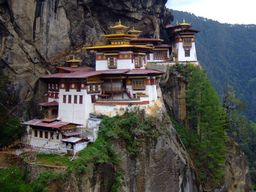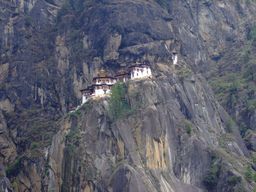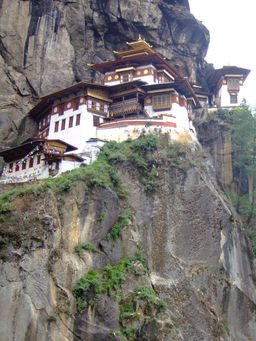Paro Taksang: Difference between revisions
mNo edit summary |
|||
| Line 7: | Line 7: | ||
==Visit of Padmasambhava== | ==Visit of Padmasambhava== | ||
[[Image:ParoTaksang-01.jpg|thumb|256px|right|'''Paro Taksang''']]<br> | [[Image:ParoTaksang-01.jpg|thumb|256px|right|'''Paro Taksang''']]<br> | ||
In the 8th Century CE Guru Rinpoche visited Bhutan and blessed it as the second Kailash. At that time malignant spirits abounded and, in order to subdue them, he assumed the terrifying form of [[Guru Dorje | In the 8th Century CE Guru Rinpoche visited Bhutan and blessed it as the second Kailash. At that time malignant spirits abounded and, in order to subdue them, he assumed the terrifying form of [[Guru Dorje Dröllo]] one of [[the Eight Manifestations of Guru Rinpoche]] and consecrated Paro Taksang as a sacred site to protect the Dharma and subdue harmful forces. | ||
==Visit of [[Langchen Palgyi Senge]]== | ==Visit of [[Langchen Palgyi Senge]]== | ||
Revision as of 12:20, 24 December 2006
Paro Taksang (spa phro stag tshang)
One of the thirteen taksang, or "Tiger Lair", sacred caves in Tibet and Bhutan blessed by Guru Rinpoche and one of the eight sacred places he blessed for the practice of the Eight Herukas. In particular this is the place related to Jigten Chöto, where Langchen Palseng, attained realization.
Visit of Padmasambhava
In the 8th Century CE Guru Rinpoche visited Bhutan and blessed it as the second Kailash. At that time malignant spirits abounded and, in order to subdue them, he assumed the terrifying form of Guru Dorje Dröllo one of the Eight Manifestations of Guru Rinpoche and consecrated Paro Taksang as a sacred site to protect the Dharma and subdue harmful forces.
Visit of Langchen Palgyi Senge
While confering the empowerments of the Eight Classes of Herukas Cycle to the Twenty-five Disciples at Yamalung, Guru Rinpoche instucted Langchen Palgyi Senge to carry out the practice of the Fierce Mantra of the Tamer of All Haughty Spirits at Taksang Senge Samdup in the Paro valley of Bhutan.
In accordance with these instructions Langchen Palgyi Senge came to Paro Taksang in 853 CE meditating until he accomplished the practice of the Tamer of All Haughty Spirits gaining profound siddhi which enabled him to bind gods and spirits to his service.
The cave in which he meditated became known as Pelphug or Drubphug.
The nine sacred caves at Paro Taksang
- Machik Phug (ma gcig phug) - the cave where Machik Labdron meditated.
- Senge Phug (sen ge phug)- the cave where Guru Rinpoche meditated on Vajra Kilaya.
- Pelphug (dpal phug) - the cave where Guru Rinpoche meditated for four months on phur pa'i lha tshogs and
- Drolo Phug (gro lod phug)
- Osel Phug ('od gsal phug)
- Gedig Phug (dge sdig phug)
- Chogyal Phug (chos rgyal phug)
- Kapali Phug (ka pa li phug)
- Phagmo Phug (phag mo phug)
Consruction of Temple
Lhakhang
There are seven chapels within the present temple complex:
- Drubkhang (sgrub khang)
- Chapel of the Speaking Guru (gu ru gsung byon ma'i lha khang)
- Drollo Lhakhang (gro lod lha khang)
- Chapel of Amitayus (rtse dpag med lha khang)
- Chapel of Vaishravana (rnam sras lha khang)
- Shrine room of Nedag Senge Samdup (seng ge bsam grub gnas khang)
- Chapel of Marpa, Milarepa and Gampopa (mar mi dvags sum lha khang)
Alternate Names & Spellings
- Padro Taksang
- Paro Taktshang
- Taksang Senge Samdup ()
- Taksang Pelphug


